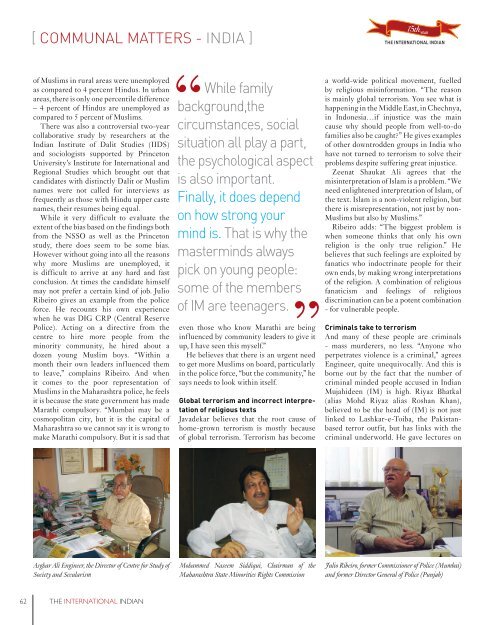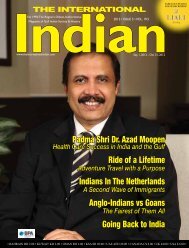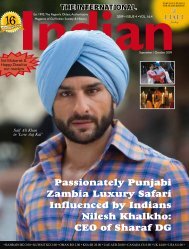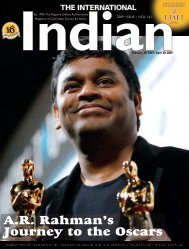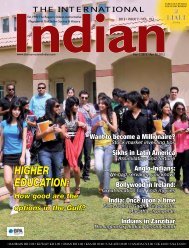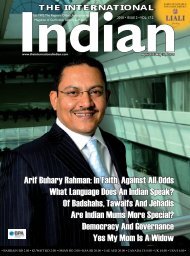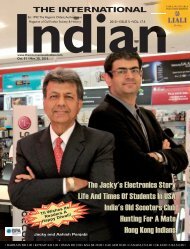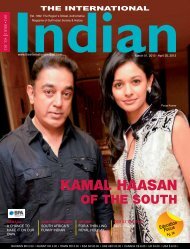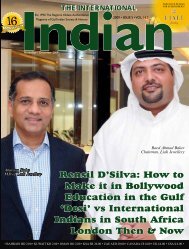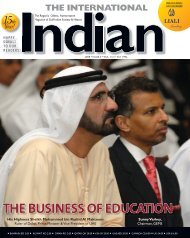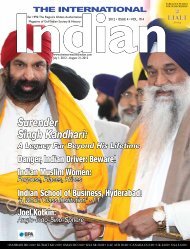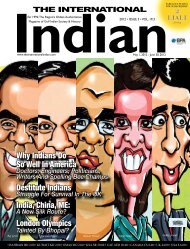THE INTERNATIONAL - International Indian
THE INTERNATIONAL - International Indian
THE INTERNATIONAL - International Indian
Create successful ePaper yourself
Turn your PDF publications into a flip-book with our unique Google optimized e-Paper software.
[ COMMUNAL MATTERS - INDIA ]<br />
of Muslims in rural areas were unemployed<br />
as compared to 4 percent Hindus. In urban<br />
areas, there is only one percentile difference<br />
– 4 percent of Hindus are unemployed as<br />
compared to 5 percent of Muslims.<br />
There was also a controversial two-year<br />
collaborative study by researchers at the<br />
<strong>Indian</strong> Institute of Dalit Studies (IIDS)<br />
and sociologists supported by Princeton<br />
University’s Institute for <strong>International</strong> and<br />
Regional Studies which brought out that<br />
candidates with distinctly Dalit or Muslim<br />
names were not called for interviews as<br />
frequently as those with Hindu upper caste<br />
names, their resumes being equal.<br />
While it very difficult to evaluate the<br />
extent of the bias based on the findings both<br />
from the NSSO as well as the Princeton<br />
study, there does seem to be some bias.<br />
However without going into all the reasons<br />
why more Muslims are unemployed, it<br />
is difficult to arrive at any hard and fast<br />
conclusion. At times the candidate himself<br />
may not prefer a certain kind of job. Julio<br />
Ribeiro gives an example from the police<br />
force. He recounts his own experience<br />
when he was DIG CRP (Central Reserve<br />
Police). Acting on a directive from the<br />
centre to hire more people from the<br />
minority community, he hired about a<br />
dozen young Muslim boys. “Within a<br />
month their own leaders influenced them<br />
to leave,” complains Ribeiro. And when<br />
it comes to the poor representation of<br />
Muslims in the Maharashtra police, he feels<br />
it is because the state government has made<br />
Marathi compulsory. “Mumbai may be a<br />
cosmopolitan city, but it is the capital of<br />
Maharashtra so we cannot say it is wrong to<br />
make Marathi compulsory. But it is sad that<br />
“<br />
While family<br />
background,the<br />
circumstances, social<br />
situation all play a part,<br />
the psychological aspect<br />
is also important.<br />
Finally, it does depend<br />
on how strong your<br />
mind is. That is why the<br />
masterminds always<br />
pick on young people:<br />
some of the members<br />
of IM are teenagers.<br />
”<br />
even those who know Marathi are being<br />
influenced by community leaders to give it<br />
up, I have seen this myself.”<br />
He believes that there is an urgent need<br />
to get more Muslims on board, particularly<br />
in the police force, “but the community,” he<br />
says needs to look within itself.<br />
Global terrorism and incorrect interpretation<br />
of religious texts<br />
Javadekar believes that the root cause of<br />
home-grown terrorism is mostly because<br />
of global terrorism. Terrorism has become<br />
a world-wide political movement, fuelled<br />
by religious misinformation. “The reason<br />
is mainly global terrorism. You see what is<br />
happening in the Middle East, in Chechnya,<br />
in Indonesia…if injustice was the main<br />
cause why should people from well-to-do<br />
families also be caught?” He gives examples<br />
of other downtrodden groups in India who<br />
have not turned to terrorism to solve their<br />
problems despite suffering great injustice.<br />
Zeenat Shaukat Ali agrees that the<br />
misinterpretation of Islam is a problem. “We<br />
need enlightened interpretation of Islam, of<br />
the text. Islam is a non-violent religion, but<br />
there is misrepresentation, not just by non-<br />
Muslims but also by Muslims.”<br />
Ribeiro adds: “The biggest problem is<br />
when someone thinks that only his own<br />
religion is the only true religion.” He<br />
believes that such feelings are exploited by<br />
fanatics who indoctrinate people for their<br />
own ends, by making wrong interpretations<br />
of the religion. A combination of religious<br />
fanaticism and feelings of religious<br />
discrimination can be a potent combination<br />
- for vulnerable people.<br />
Criminals take to terrorism<br />
And many of these people are criminals<br />
- mass murderers, no less. “Anyone who<br />
perpetrates violence is a criminal,” agrees<br />
Engineer, quite unequivocally. And this is<br />
borne out by the fact that the number of<br />
criminal minded people accused in <strong>Indian</strong><br />
Mujahideen (IM) is high. Riyaz Bhatkal<br />
(alias Mohd Riyaz alias Roshan Khan),<br />
believed to be the head of (IM) is not just<br />
linked to Lashkar-e-Toiba, the Pakistanbased<br />
terror outfit, but has links with the<br />
criminal underworld. He gave lectures on<br />
Asghar Ali Engineer, the Director of Centre for Study of<br />
Society and Secularism<br />
Mohammed Naseem Siddiqui, Chairman of the<br />
Maharashtra State Minorities Rights Commission<br />
Julio Ribeiro, former Commissioner of Police (Mumbai)<br />
and former Director General of Police (Punjab)<br />
62<br />
<strong>THE</strong> <strong>INTERNATIONAL</strong> INDIAN


